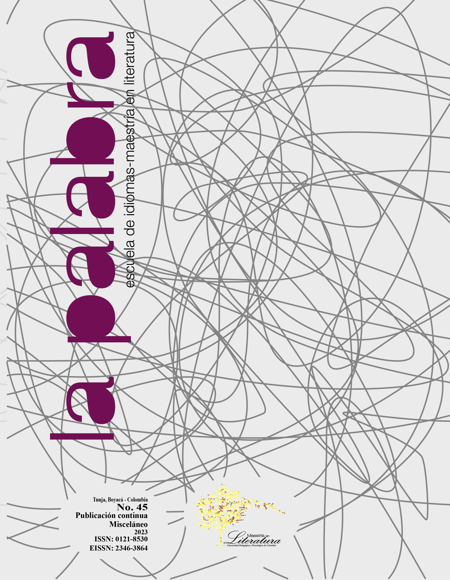Cubanidade, exilio e artista em La memoria del agua de Héctor Santiago

Resumo
O artigo investiga a questão da Cubanidade está ligada à figura do exilado ou artista como uma condição de vida que estabelece a consciência geográfica e fronteriça. Teoricamente, interpretamos La memoria del agua de Héctor Santiago da modalidade transcultural de Ortiz (Contrapunteo), a localização epistemológica de Mignolo (La idea) e a consciência de fronteira de Anzaldúa para mostrar como a cubanidade do exílio tenta configurar a consciência geográfica e a lógica da fronteira. Observamos que o personagem Santiago existe tanto como exilado quanto como escritor, pois vive a tripla condição existencial da gaiola, fuga e retorno. Isto faz de La memoria del agua, o lugar e o tempo representativos da Cubanidade. Descobre-se que a Cubanidade se baseia na atitude consciente do exílio, cujo objetivo é estabelecer a existência de uma consciência geográfica que inclui a da fronteira.
Palavras-chave
Cubanidade, exiliado, artista, consciência geográfica, corpo
Biografia do Autor
Charles Didier Noa Bela
Charles Didier Noa Bela é PhD em Literatura Comparada Hispano-Americana pela Universidade de Yaoundé 1 (2021), Camarões. Atualmente, é professor de Língua e Literatura na Seção de Espanhol do Departamento de Línguas Modernas da Universidade de Gana. Sua pesquisa se concentra principalmente em questões literárias e na relação entre a literatura e outros campos do conhecimento, como filosofia, antropologia, história e estudos de tradução.
Referências
- Anzaldúa, Gloria. Boderlands/La frontera: The New Mestiza. Traducción de Carmen Valle. Capitán Swing Libros, 2016. Impreso. DOI: https://doi.org/10.1515/9780773551886-027
- Bhabha, Homi. El lugar de la cultura. Traducción de César Aira. Edición Manantial, 2002. Impreso.
- Besserer, Federico. “Estudios transnacionales y ciudadanía transnacional”. Mummert, Gail (Ed.), Fronteras fragmentadas. Colegio de Michoacán, 1999, pp. 215-238. Impreso.
- Bueno, Gustavo. El mito de la cultura. Pentalfa Ediciones, 2016. Impreso.
- Butler, Judith. El género en disputa. El feminismo y la subversión de la identidad. Ediciones Paidós Ibérica, 2007. Impreso.
- Dussel, Enrique. El encubrimiento del otro: hacia el origen del mito de la modernidad. Plural Editores, 1994. Impreso.
- Martí, José. Nuestra América. Edición crítica de Cintio Vitier, Universidad de Guadalajara, Centro de Estudios Martianos, 2002. Impreso.
- Marrero, Fernández. La raíz de la creación. Ensayos sobre la cubanidad del siglo XX. Universidad Central “Marta Abreu” de Las Villas, Editorial Feijóo, 2018. Impreso.
- --- Critique de la raison nègre. La Découverte, 2013. Impreso.
- ---. “La idea de América Latina (la derecha, la izquierda y la opción decolonial)”.. Crítica y Emancipación, Año I, núm. 2, 2009, pp. 251-276. Impreso.
- Ortiz, Fernando. Contrapunteo cubano del tabaco y el azúcar. Universidad Central de Las Villas, Direcciones de Publicaciones, 1963. Impreso.
- ---. “Los factores humanos de la cubanidad”. En Vitier, Medardo. Del ensayo americano. Vol. XIV, 1945, pp. 161-186. Impreso.
- Santiago, Héctor. La memoria del agua. Aduana Vieja Editorial, 2012. Impreso.
- Spivak, Gayatri. “Can the Subaltern speak?”In Nelson, Cary and Gossberg, Lawrence. Eds.
- Marxism and the Interpretation of Culture, 1988, pp. 271-313. Impreso.